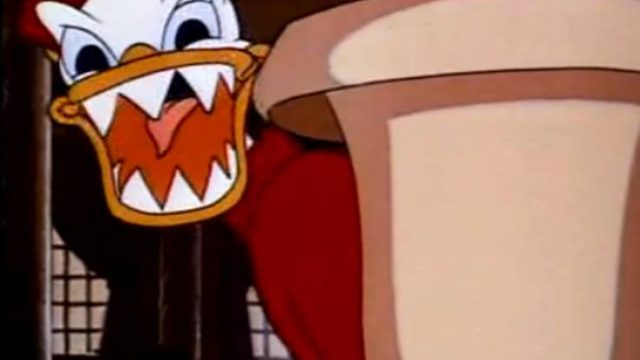For once, I’m on Donald’s side, here. Maybe that’s the secret—put him in the service industry and inflict unpleasant children on him. Because Donald is really trying, here, and very little of what goes wrong is his fault. What’s more, he’s doing his level best to keep his temper, which I suppose proves he can do it if he’s required to. I’d also note that he’s being physically abused here, and while he should treat people with decency regardless of the situation, that doesn’t mean he needs to accept that from someone, no matter how rich.
Donald is working as a bellboy and is informed that, if there’s one more incident, he is going to be fired. A very rich man, in theory Pete but voiced by John McLeish, is checking in, along with his son, Junior (Clarence Nash). Junior is fascinated by the idea that he can get away with whatever he wants, and he proceeds to treat Donald like absolute garbage, setting him up to get fired. Donald is required to hold his temper and treat the little demon with more respect than he’s shown himself.
This is the thing—in most service jobs, Donald absolutely would be fired for standing up for himself in this situation. Not just for eventually beating the tar out of the kid, which we all know is our eventual end result. Frankly, it feels to me rather as though he’s planning to just beat him to death there in the lobby. But he wouldn’t even be allowed to tell the kid to knock it off and just treat him with respect. The Guest Is Always Right, says Donald’s badge, and if he doesn’t take that to heart even while he’s being abused, he’s going to lose his job. It’s a toxic ideology that’s still at the heart of a lot of service expectations.
It’s also worth noting that Junior is not being disciplined by his father, who might be expected to step in. If we’re going to say that, for the time, parenting was women’s work, then it should have been Pete’s obligation to ensure there was a supervisory woman there. It’s clearly just Pete and Junior, and Pete is letting Junior get away with what would be literal murder if this weren’t a cartoon. Which goes a long way toward explaining Junior’s attitude toward the whole thing. He has a sense of entitlement because his life has fed a sense of entitlement.
This is not really PJ, who would appear as Pete’s son in the Goof Troop era, any more than you can really take Max from the boy who is Goofy’s son in the George Geef era of cartoons. This is a thoroughly unpleasant little kid who would not be able to turn into the not utterly terrible PJ. If this kid were PJ, Max wouldn’t survive long enough to go to college, because Goofy wouldn’t step in the way Donald does when this kid attempted murder. I haven’t watched a lot of Goof Troop, but I think it’s more that the animators forgot this kid existed.
I may not think the Patron Is Always Right, but there are nifty goodies this week for those who support my Patreon, and I wouldn’t say no to a tip on Ko-fi!
Note: The poster says “Bell Boy Donald.” The title card, however, is “Bellboy Donald.” Or, really, “BELLBOY DONALD.”

